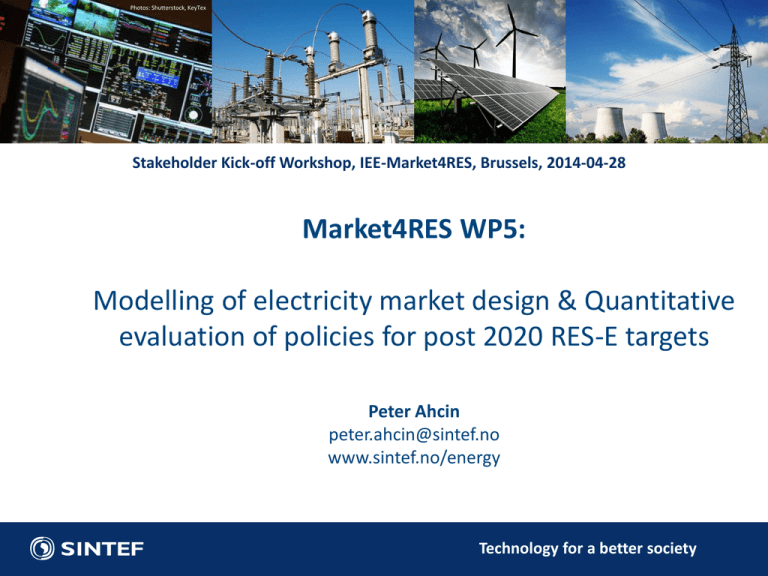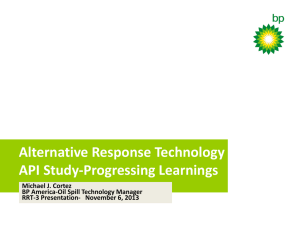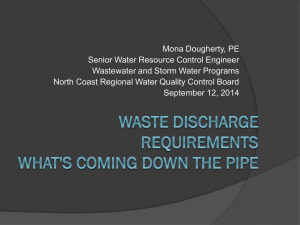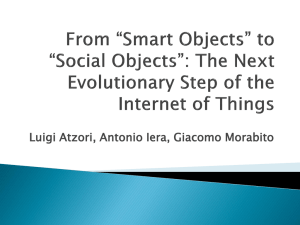Modelling of electricity market design & quantitative
advertisement

Photos: Shutterstock, KeyTex Stakeholder Kick-off Workshop, IEE-Market4RES, Brussels, 2014-04-28 Market4RES WP5: Modelling of electricity market design & Quantitative evaluation of policies for post 2020 RES-E targets Peter Ahcin peter.ahcin@sintef.no www.sintef.no/energy Technology for a better society WP5 objective As current RES support schemes are phased out after 2020 new kinds of market mechanisms will have to be implemented that will in accordance with the EU energy policy: • Promote a competitive market with large shares of renewables and without support mechanisms • Guarantee security of supply by providing market incentives to invest in generation WP5 will define a framework in which the effectiveness of market mechanisms regarding the above goals can be studied and provide the first results. Technology for a better society WP5 task description Task 5.1 (RTE, SINTEF, IIT-COMILLAS) Assumptions for the defined market design elements to be taken into account for the techno-economic analyses of new policies • Regulatory provisions pertaining to the energy transition - Describe support schemes for RES from WP2&WP3 - Determining relevant incentives for low carbon non-RES technologies • Capacity markets - Cross-border or national - Technology specific or neutral - Tender based • Regulatory provisions for demand side management Technology for a better society WP5 task description Task 5.2 (RTE, SINTEF, TECHNOFI) Identification of scenarios to be tested for the techno-economic analyses of new policies • Defining (limiting) the scope of economic studies to be performed • Coordination with WP3 to define the research questions for technoeconomic analyses and modeling • Select the relevant regulatory provisions • Establishing base cases (coupled day-ahead markets, but different capacity markets) • Identifying the required data to perform numerical simulations and data sharing regimes Technology for a better society WP5 task description Task 5.3 (SINTEF, RTE, IIT-COMILLAS, EEG) Identification of models used for quantification • Discussion of all participants' models; will require long term investment models or long term load-supply models. • Discussion on which models should be used to study which policies. • Will include tools used in WP4 • Intense interaction with WP3 to determine how different policies can be studied with the use of available models • If no model is available simple models will be developed. Technology for a better society Available models • EMPS model (SINTEF Energy Research) Hydropower scheduling used in Nordic market. • CEO Model (IIT-COMILLAS) (also El. Certificates and capacity development.) • ROM (IIT-COMILLAS) • MILLA-RES (IIT-COMILLAS) Input: details for hydro & other RES, thermal gen., demand, transmission capacity and statistics for stochastic variables. • MITHRAS (EEG) • RTE MODELS (RTE) Data: available for Nordic area. Will need to be updated for required future scenarios. Technology for a better society 6 Available models • EMPS model (SINTEF Energy Research) • CEO Model (IIT-COMILLAS) • ROM (IIT-COMILLAS) • MILLA-RES (IIT-COMILLAS) Long-term generation expansion model to perform analyses of generation adequacy Input: installed capacity and tech. data, inv., fuel and CO2 costs, RES and demand growth scenarios. Output: Newly installed thermal capacity, power generation by tech, CO2 ems, system costs. • MITHRAS (EEG) • RTE MODELS (RTE) Data: available for Spanish system up to 2050. Partners to fill in for other regions. Technology for a better society 7 Available models • EMPS model (SINTEF Energy Research) • CEO Model (IIT-COMILLAS) • ROM (IIT-COMILLAS) • MILLA-RES (IIT-COMILLAS) Technical and economic impact of intermitent generation and other types of emerging technologies Input: Hourly RES production, thermal gen. capacity, weekly hydro gen., hourly demand, transfer capacity. Output: output per tech. and area, energy not served, RES spillages per area, market prices. • MITHRAS (EEG) • RTE MODELS (RTE) Data: available for Spanish system up to 2050. Partners to fill in for other regions. Technology for a better society 8 Available models • EMPS model (SINTEF Energy Research) • CEO Model (IIT-COMILLAS) • ROM (IIT-COMILLAS) • MILLA-RES (IIT-COMILLAS) Evaluate impact of intraday and reserve market design on integration of intermittent generation. Input: Hourly RES forecasts, thermal gen. capacity, hydro inflows, hourly demand. Output: generation by tech., RES curtailment, use of balancing, operation costs. • MITHRAS (EEG) • RTE MODELS (RTE) Data: available till 2020 for Iberian peninsula. Partners to fill in for other regions. Technology for a better society 9 Available models • EMPS model (SINTEF Energy Research) • CEO Model (IIT-COMILLAS) NPV based model that estimates the competitiveness of photovoltaic systems; • ROM (IIT-COMILLAS) • MILLA-RES (IIT-COMILLAS) • MITHRAS (EEG) • RTE MODELS (RTE) Applicable to household, commercial, tertiary and industrial sector; Available data: solar irradiance measured and standardized profiles; projected costs of PV systems. To be updated within project. Technology for a better society 10 Available models • EMPS model (SINTEF Energy Research) • CEO Model (IIT-COMILLAS) ANTARES-based models for long-term economic equilibrium; reveal needs for capacity. • ROM (IIT-COMILLAS) • MILLA-RES (IIT-COMILLAS) • MITHRAS (EEG) • RTE MODELS (RTE) Investment dynamics model; show how market architecture will drive actors. Available data: solar irradiance measured and standardized profiles; projected costs of PV systems. To be updated within project. Technology for a better society 11 WP5 task description Task 5.4 (IIT-COMILLAS, SINTEF, EEG) Simulations of the effects on the preselected scenarios Scenarios will be evaluated with links with the policies and market-structures as proposed by WP3. This will be done using the following options - Existing numerical tools for the European power market - Smart use of model - Case-specification - Numerical illustrations of principle small-scale models Technology for a better society WP5 task description Task 5.5 (SINTEF, RTE, IIT-COMILLAS, EEG, TECHNOFI) Expert workshop and follow-up stakeholder consultation process & stakeholder-event – Expert-Workshop: interaction with ACER and national regulators, as well as policy makers, DG Energy and ENTSO-E. (D5.1 Assumptions, scenarios and models) – Stakeholder Workshop: discussion of final results. (D5.2 Quantitative evaluation of policies for post 2020 RES targets) BRUSSELS JUNE 2015 BRUSSELS FEB. 2016 Technology for a better society Deliverables • D5.1 Report on assumptions, scenarios and choice of models for quatification (RTE M18) • D5.2 Report on quantitative evaluation of policies for post 2020 RES-E targets (SINTEF, M24) • D5.3 Minutes and recommendations of the expert workshop and follow-up consultation process & stakeholder event allocated to work in WP5 (SINTEF, M24) Technology for a better society 14 Output • Description of overall methodology for techno-economic analysis of studied policies; • Comparison and impact of novel market designs and policies from WP3; • Interim report on possiblities and limitations for wxisting models available in project; • Interim report for each case-study of considered policies; • Publication of case-studies in conferences and journals Technology for a better society 15 Example from EMPS work & Nordic Market • SINTEF is running a Norwegian project on modeling of the Green Certificates market arrangement for the Nordic market, e.g. trying to estimate the price of GC in future scenarios with high RES shares in the Nordic market. • We would like very much to explore how this GC scheme could extend to the Offshore Grid, direct coupling to IEE NorthSeaGrid project! • Enlarge the discussion on harmonization of market rules and market designs (for Offshore Grids and in general for the IEM). • Link the ongoing discussion of CWE Flow-Based Market Coupling and the (further) development – implementation of Network Codes post 2020 and with high RES shares in 2030. Technology for a better society 16 Harmonization of market rules and market designs • Enlarge the discussion on harmonization of market rules and market designs (for Offshore Grids and in general for the IEM). • Link the ongoing discussion of CWE Flow-Based Market Coupling and the (further) development – implementation of Network Codes post 2020 and with high RES shares in 2030. Technology for a better society 17 Market4RES, Public Kick-Off, WP2 Brussels, 28th April 2014 Mithras • NPV-based economic trade-off analyses of PV generation in all sectors (households, commerical/industry, utility-scale, non-grid connected) • Using real (measured) load profiles data and also standardized load profiles on an 1/4 –hourly basis • All parameters in the GUI can be edited/varied by user (tailor-made individual PV project analysis incl. sensitivity analysis possible) • Monte-Carlo simulation of all parameters implemented (mean value, standard deviation, lower/upper limit) • Optimisation of size of individual PV system fulfilling different criteria/constraints (e.g maximizing self consumption, economic benefits, etc.) • Identification of „expected“ market electricity price for feeding excess PV generation into the grid (incl. corresponding economic trade-offs) to meet some predefined economic criteria • Developed within the IEE project www.pvparity.eu • Application so far: 12 European Countries (AT, BE, CZ, DE, EL, ES, FR, IT, NL, PT, UK) Tools • CEO – – – – – Role in Market4RES: computation of the optimal deployment of conventional generation given RES generation penetration objectives Input: installed capacity and tech. data, inv., fuel and CO2 costs, RES and demand growth scenarios Output: Newly installed thermal capacity, power generation by tech, CO2 emissions, system costs Other EU projects: SUSPLAN National projects: • • • Market4RES 28 – 29 April, 2014 CENIT-GAD: economic and regulatory analysis of DSM; Prospective analysis of RES generation Competitiveness of nuclear power plants (Energy Economics) 19 Tools • Market4RES 28 – 29 April, 2014 MILLA-RES – Role in Market4RES: Evaluate short-term (intraday and balancing) market designs on integration of intermittent generation – Input: Hourly RES forecasts, thermal gen, capacity, hydro inflows, hourly demand – Output: generation by tech., RES curtailment, use of balancing, operation costs – New model: no previous experience with it 20 Tools • Market4RES 28 – 29 April, 2014 ROM – Role in Market4RES: simulation of the short-term operation of a system, possibly considering several network areas – Input: Hourly RES output and demand time series, weekly hydro output time series, thermal gen. capacity, unit production costs, technical features of units – Output: operation costs, generation by each unit, RES curtailment, market prices, use of balancing reserves – Other EU projects: SUSPLAN, TWENTIES, MERGE, GRIDTECH – National projects: CENIT-VERDE 21






